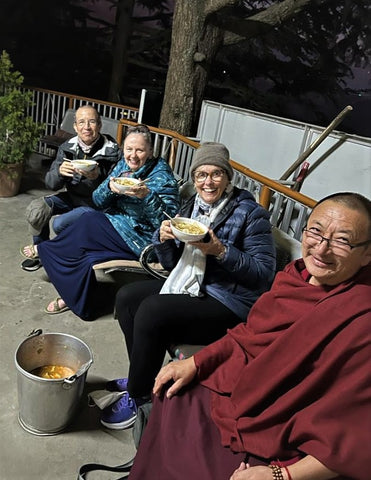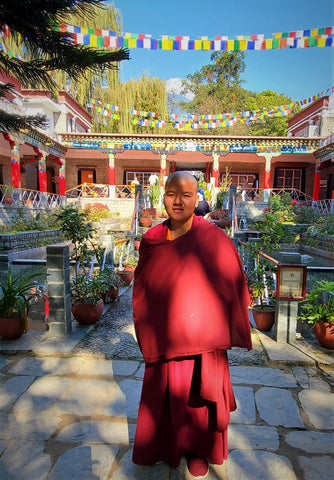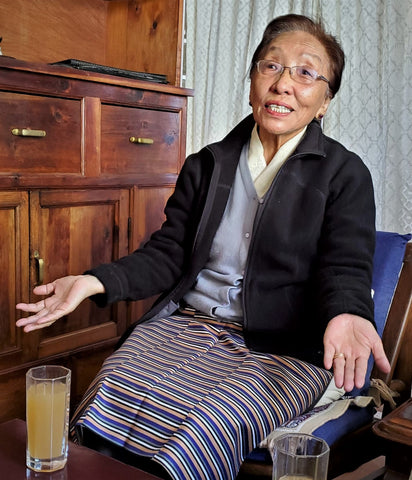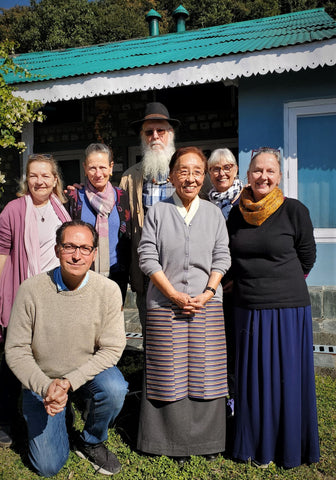News
Wise Selfish and the People Pleasing Trap: How Speaking Up and Saying "No" Can Be Acts of Compassion April 20, 2024 13:26

If you prefer to listen to this post, please click HERE for the audio link.
I recently read a quotation that a friend had posted on her FB page that stopped me in my tracks. I read it over and over. I took time to contemplate it. It resonated for me--and it was exactly what I needed at that time.
"Emotional availability is being present to your feelings and needs and being willing to share them, and allowing the other person to have their own feelings and responses to your needs.

If you prefer to listen to this month’s offering, please click HERE for the audio link.
“The stupid way to be selfish is seeking happiness for ourselves alone. The intelligent way to be selfish is to work for the welfare of others.” His Holiness the 14th Dalai Lama
Sometimes, saying “No” is an act of compassion and wise selfishness. Women, in particular, tend to have trouble with this—we often feel pressured to take on more than we can handle in order to appease, please, and help others.
However, not standing up for ourselves and saying “No” when the situation may be too demanding or inappropriate can be detrimental to our emotional and physical well-being.
I am not a fan of suppressing, masking, or ignoring emotions. I am also not a fan of indulging, lashing out, and bombarding others with them either. Keeping feelings bottled up without acknowledging or processing them usually leads to bigger problems for me later on. Whether it’s because of a single major trauma or an accumulation of several small issues over time, my body will let me know if I’m not paying close enough attention to my emotional well-being.
For example, over the years, I have dealt with the physical consequences of frozen shoulder syndrome, Bell’s palsy, and shingles as either the direct or indirect results of not dealing with my emotions effectively.
According to HHDL, “There is nothing inherently wrong with pursuing one’s own interests. On the contrary, to do so is a natural expression of our fundamental disposition to seek happiness and to shun suffering. In fact, it is because we care for our own needs that we have the natural capacity to appreciate others’ kindness and love.”
One recent, and very mild, example that comes to mind happened recently after a Dharma teaching at TMBCC. A kind-hearted and devoted sangha member stopped me after the teaching to introduce me to a visitor who was new to the Center.
We exchanged greetings, and he told me that he recently graduated from IU and wanted to attend a Dharma talk. My kind-hearted friend then said, “Teresa is great! She will give you her number, and you can text her if you have any questions.”
Keep in mind, this man was a complete stranger to me. As she was saying this to him, I looked this man in the eye while shaking my head and said, “No…I will not be doing that. I will not be giving you my number. You will not be texting me. I don’t know you, and you don’t know me. If you have any questions while you’re here, please feel free to ask. I'll be happy to help if I can.”
He nodded his head in agreement the entire time I was talking as if to say, “I get it. It’s OK. No worries!”
Now, this response may seem logical and normal, but, believe it or not, it required time, processing, courage, and work on my part to respond in this way, mainly because this was not the first time that this kind-hearted sangha member had said this sort of thing to new visitors.
“Being foolish selfish means pursuing our own interests in a narrow, short-sighted way. Being wise selfish means taking a broader view and recognizing that our long-term individual interests lie in the welfare of everyone.” HHDL
On a few previous occasions, this same kind-hearted friend had escorted strangers over to me who happened to live in Greenwood, a town which has a population of 65,000 and is an hour’s drive from Bloomington, and had told them that we could ride share, and that I would drive them to the Center. Then, she’d walk away immediately, leaving me to have an awkward conversation with people who I didn’t know.
I’m not going to lie; these rare, unexpected exchanges were extremely anxiety-producing for me. Each time, I felt pressured to do something that I did not feel safe or comfortable doing. (I’ve seen far too many Dateline episodes to know better than to drive strangers around in my car by myself.) In addition, these brief exchanges made me feel resentful and frustrated toward my Dharma friend.
During these previous incidents, I didn’t have time to react or feel anything. I was caught off guard—confused and blind-sided—and I didn’t have the wherewithal to speak up and set a healthy boundary.
In fact, somewhere out there, there is a woman who actually has my cellphone number. My kind-hearted Dharma friend had pressured me into giving it to her, and for weeks, I worried that she would text me and ask me to pick her up to take her to Bloomington. For all I know, she may have wondered if that strange lady she met at TMBCC was expecting her to reach out for a ride to B-town. This may have caused anxiety for both of us.
I can’t speak for anyone else—in fact, that was the root of this problem—someone had overstepped and had spoken for me without my permission or consent, and it took me a while to process the feelings I had about this.
I felt frustrated, not only at my kind-hearted Dharma friend for putting me in this awkward position, but also at myself for not speaking up right then and there.
“Being wise selfish means being compassionate…Compassion and discernment are mutually reinforcing.” HHDL
Actually, it took some time for me to process these feelings, and processing for me means talking to myself in the car (so, if you happen to see me driving and I’m talking to myself, you’ll know what’s happening😉) or writing about it.
Once I take the time to contemplate, talk, or write about these feelings that surface, I’m able to settle down, think clearly, and then calmly respond to future situations more effectively.
This takes me back to something one of my graduate school professors said years ago, “Feelings aren’t good or bad; they just are.” Or, stated another way, “You have to feel the feelings before you can heal the feelings.” Taking the time to process feelings helps me to do just that!
“Where we DO have control is at the level of motivation in deploying our critical, intelligent faculties—our discernment.” HHDL
Because this kind of situation had happened before, on at least two previous occasions, and because I had taken the time to acknowledge and process the feelings that had surfaced, this time, I was able to say “No” with conviction and confidence to this most recent visitor, and, in the presence of my kind-hearted Dharma friend. In effect, I was demonstrating discernment, I was setting a healthy boundary, and I was practicing wise selfishness (compassion).
By the way, my kind-hearted friend did reach out to me later that day via text and apologized for her impulsiveness. I accepted her apology, and all is well.
Suppressing feelings—ignoring them—masking them—pushing them down—all of these are just asking for trouble, if you ask me. I certainly don’t need another shingles outbreak or some weird, neurological episode to remind me of the importance of naming, claiming, and effectively dealing with my emotions.
Over the years, I’ve heard several Dharma teachers explain the importance of contemplating, investigating, and analyzing the teachings before accepting them as the truth. It’s essential to take time to digest and understand them before meditating on them.
Well, this applies to experiences in everyday life as well—especially for those unexpected situations when I don’t have time to think about how I feel until later.
I love my kind-hearted Dharma friend. She means well, even though she sometimes oversteps.
I love going to TMBCC for weekly Dharma talks, and I enjoy meeting the visitors who come for teachings, too.
I especially love being able to apply what I learn both on and off the cushion.
Taking the time to process what I learn and what I feel helps me to hone my capacity for critical thinking, discernment, and compassion.
***
I hope the month of March has treated you well, and I hope April treats you even better.
Please check out the current Middle Moon Malas collection, and don’t hesitate to reach out if you have custom design requests or if you need to have a mala restrung.
Quotes from HHDL came from the book Beyond Religion.
Photo Credit: Andrys from Pixabay
Interdependence and the Trip of a Lifetime: The Balance of Giving and Receiving December 31, 2022 13:33

(View from Namgyal Monastery, HHDL's temple in Dharamshala)
If you prefer to listen to this month's blog post, please click HERE for the audio link.
Americans, in general, are a bit fussy about independence. We like to be able to do things "all by ourselves," and many of us are hesitant to accept help from others. However, one of the biggest lessons that my Buddhist practice has taught me is that we are constantly riding the waves of our own personal and collective karmas, and that because of various causes and conditions, no one journeys through life alone--we are interdependent beings, whether we realize it or not. Life is more fun when you realize it, though.
I was very fortunate to be able to travel with a group of Dharma friends to India in November. We spent a week near a monastery in South India, and then we went to Dharamshala in North India for a week or so.
This truly was an amazing trip of a lifetime, and it would not have been possible without the presence, assistance, patience, kindness, compassion, generosity, expertise, and effort of many, many others.
One of the biggest lessons of this trip for me focused on the importance of giving and receiving--especially maintaining a healthy balance between these two actions.
Too much giving--especially feeling pressured to give, can leave me feeling depleted and exhausted. By the same token, too much receiving makes me feel uncomfortable, undeserving, selfish, and mired in the grippy tangle of attachment.
This trip was a beautiful dance of give and receive, and our group members were willing participants in its choreography.
One of the things we were grateful for was the delicious food we enjoyed while in India. While we were in Delhi, we were invited to a dinner at the Tashi Kyil Guest House and were served steaming platters of momos, veggies, fresh bread, and cups of hot chai.
I remember hearing the clatter of dishes, pots, and pans--the hiss of steam--the spray of water in the kitchen. Many hands were involved in preparing this meal, and it was delicious.
We enjoyed all of the meals during our trip, whether they were served in fancy hotels or prepared in tiny local restaurants, like Dolma's Kitchen in Dharamshala, where all the food was made from scratch--the tea from the Norbulinka Cafe, the cheesecake and yogurt mousse from a tiny restaurant near Namgyal Monastery--and all those wonderful honey lemon ginger teas and cappuccinos.
No matter where we went, we were greeted with warm, smiling faces and sincere service. We pooled our rupees and took turns paying for each other's meals. It was a beautiful exchange of give and receive--one fueled by meaningful service and gratitude.

(Geshe Kunga treated us to tea at an outdoor cafe along the kora in Dharamshala)
We did not partake in street food. However, one of my favorite meals was "soup in a bucket." Our teacher, Geshe Kunga, who took very good care of us throughout this trip, sent us an urgent message one evening to come to the temple. We hurried down dark, crowded streets to Namgyal Monastery to be greeted by Geshe-lak, who served us steaming bowls of spicy vegetable soup with thick, hand-made noodles from a large metal bucket. He had sponsored a dinner and wanted to share it with us, too. Monks from Namgyal prepared it for their sangha members. We sat on metal benches at the Dalai Lama's temple and enjoyed the warm, savory soup that was lovingly prepared by many monks for the benefit of many others.

(Mmmm...mmmmm...good. Sangha members enjoying homemade soup)
Interdependence was literally all around us--and it was not limited to restaurants and coffee shops. It was with us in the bustling Delhi airport--it was with us in traffic as taxi drivers gracefully chauffeured us among other cars, trucks, tuk tuks, scooters, pedestrians, and even livestock on crowded streets.
Interdependence was with us as we navigated our way on foot through narrow alleyways of the Tibetan Quarter in Manju ka Tila, busy markets near Hubballi, and the sloping network of streets in McCleod Ganj.
***
We had so much to be thankful for on this trip, but the day before Thanksgiving, we had the opportunity of a lifetime--our group had an audience with His Holiness the Dalai Lama.
I can't begin to fathom all of the causes and conditions that had to align in order for this meeting to occur, but we were beyond appreciative.
I remember waking up at 3:00 AM in my hotel room at the Serkong House. I was too keyed up to practice, so I sat in bed and chanted the long Chenrezig mantra. I made a cup of tea, continued to chant, and waited.
Later, I showered, changed into a chupa (Traditional Tibetan dress) and pangden (apron) and met the rest of our group in the lobby at 6:15 AM.
We walked to the temple in the cool darkness. A black feral dog walked with us, escorting us most of the way to Namgyal Monastery. I was a little nervous about our meeting, but continuing to chant the Chenrezig mantra helped me remain calm, clear, and focused.
Geshe Kunga was waiting for us at the gate, and we walked to the office where we all took Covid tests. Our group was scheduled to meet with HHDL last that morning.
We showed our passports, went through security, and waited. We placed objects that we brought with us for HHDL to bless on a small table. I brought my white Selenite mala and a small quarter mala that I had made for someone special and gave these to the attending monk.
When it was time, our group was ushered upstairs to a room where couches and several chairs were arranged on either side of HHDL's seat in the middle of the room. Once we were seated, we remained very quiet as attending monks bustled quietly around us. One brought in a tray of beautiful statues and placed it on a nearby table.
We could hear groups of people just outside the door, and occasionally, HHDL's voice and gentle laugh as he patiently greeted those who came to see him, along with the rapid shutter clicks of a camera.
We waited quietly in the room for thirty minutes or so. Geshe Kunga gave each of us a Medicine Buddha statue from the tray to offer to HHDL. We unfurled our khatags that we brought and rested the statues on them in our laps. Then, His Holiness quietly entered the room, flanked by attending monks who guided him to his seat. All of my nervousness melted away, and I felt very calm and at ease in his presence.
Takster Rinpoche, a young lama who is connected to our Bloomington center, was kneeling on the floor beside him. Our connection to this young lama is the reason why our group was here--and why this private audience was possible.
His Holiness was very kind and nurturing to the young Rinpoche. He affectionately touched his head and patted him as he talked to us. He encouraged Rinpoche to continue his studies, and he emphasized that this was very important. His sincerity and encouragement were quite moving for all of us, particularly for Rinpoche, who wept quietly as he spoke to him.
Afterwards, attending monks helped us to line up with our offerings. At the last moment, while I was waiting in line, one of the monks, Geshe Sangay, gave me a beautiful jeweled conch shell to offer as well.
My mind was calm, and my hands were full with beautiful offerings. When it was my turn, I knelt down before HHDL as attending monks collected the offerings; in turn, they gave me a small Buddha statue that had been blessed by HHDL. We met eyes and smiled. He held my gaze briefly, leaned forward to pat my cheek, and brought his forehead to touch mine.
No words were spoken--and they weren't necessary-- it was merely a quiet exchange of sincerity, joy, compassion, and gratitude.
He placed the khatag around my neck, attending monks helped me to my feet, and they led me out of the room.
Our group gathered our things and blessed items and took several group photos in front of the temple. We walked back to the Serkong House for breakfast in a blissful state--among fellow pedestrians, scooters, tuk tuks, vendors, monastics, and feral dogs. I have never felt a stronger sense of connection to all of humanity in my life. I felt calm, connected, and interconnected to everyone and everything around me. It was a beautiful experience and a memory that I will treasure always.

(Meeting HHDL was a joy)

(Dharma friends with HHDL)

(Group photo with our group outside HHDL's office)
***
Every day of this trip was an adventure, and every day revealed the reality and significance of interdependence.
Meeting His Holiness was an amazing and meaningful opportunity, but I was hoping to meet someone else who was just as special to me.
I have been sponsoring a nun through the Tibetan Nuns Project for several years. Venerable Tsundue Palmo resides at Tilokpur nunnery, which is about an hour away from Dharamshala. Before our trip, I had reached out to TNP administrators to see if it would be possible to arrange a visit during our trip. Our schedule was tight and unpredictable, but many hearts and hands came together again to bring Venerable to Dolma Ling, a nunnery much closer to Dharamshala.
Honestly, I was a little more nervous about meeting her than I was meeting HHDL. Our group had rented a car and traveled to Gyuto Monastery first. The buildings were painted bright yellow, birds were everywhere, and young monks were chanting mantras from open windows. It was a beautiful, sunny day--Thanksgiving Day in the U.S.
Then, we traveled to nearby Dolma Ling and met with Tenzin, who helped make this meeting possible. After a few minutes, a car arrived at the nunnery, and I was able to meet Ven.Tsundue Palmo in person. I was surrounded by my Dharma friends when Tenzin introduced us. I offered Venerable a khatag, a donation in a bright orange envelope, and the quarter mala that I had made for her, which had been blessed by HHDL the day before.
Venerable was very soft-spoken, peaceful, and pleasant. Tenzin took us on a tour of Dolma Ling nunnery, and we stopped by the office so my friends could make prayer requests and donations to TNP. Then, we invited Venerable to join us for lunch at nearby Norbulinka, a beautiful monastery with a museum, restaurant, and gift shop.
Another member of our group, Victor, happened to be connected with the project manager at Norbulinka, Nyima, and she graciously treated our group to lunch and a tour of Norbulinka. It was another wonderful day--and interdependence made it all possible.
It was a joy meeting Venerable in person, and it definitely strengthened my motivation to continue to support her and the Tibetan Nuns Project.

(Victor taking a photo of me offering a khatag to Venerable Tsundue Palmo)

(Venerable and I --a joyous meeting)

(Venerable after lunch at Norbulinka)
***
Our group was riding the waves of our collective good karma, but it wasn't finished with us yet. Another member of our group, David, had met with Rinchen Khando Choegyal years ago when he had traveled to India in the 70s. This previous meeting with her was extremely inspiring and meaningful for him, so he reached out and managed to arrange a private audience with her and our group.
Rinchen-lak is the founder and special advisor of The Tibetan Nuns Project. She is the former Minister of Education in the Tibetan Government-in-Exile, and she is the founding President of the Tibetan Women's Association. Oh, and she's also HHDL's sister-in-law.
Later in the week, we rented a car and drove to Kashmir Cottage to meet with her. We were seated in a small, airy room where her attendant brought us glasses of ginger tea.
She was very kind and generous with her time. We talked with her for an hour. She told us that her family was originally from Kham in Tibet, and her family came to India in 1958, a year before the Chinese invaded Tibet.
She came from a wealthy family and was able to attend school. Rinchen-lak later married the Dalai Lama's brother, and she started a bakery to provide food for other Tibetan refugees. She also helped provide clean water for the nuns at Tilokpur (the same nunnery where Ven. now resides) and opened Kashmir Cottage as a guest house.
She worked very hard to ensure that the nuns were fed and cared for--that they had qualified teachers and received a good education. She emphasized practical, foundational matters, tending to the physical wellbeing and mental health for the nuns as well as practicing Dharma.
Rinchen-lak was a kind-hearted, generous host, but in hearing her story, she was also wise, fiercely determined, and dedicated to helping the Tibetan people and to preserving the Dharma and Tibetan culture. Her work in educating and supporting Tibetan Buddhist nuns is beyond inspiring, and her primary message to us was..."For everything that you have, now it is time to give something back."
This is the essence of interdependence.

(Rinchen Khando Choegyal at Kashmir Cottage)

(David expresses his gratitude)

(Dharma friends with Rinchen-lak)
These were just some of the highlights of our trip to India. There were actually many other examples and many more wonderful people that I could have mentioned in this article.
I am very grateful to have experienced all of the events of this trip with my Dharma friends. Much gratitude to Geshe Kunga and TMBCC for making this trip possible. My hope is that sharing these moments with you will be of benefit as well.
May you give and receive with an open heart.
May you graciously accept help from others and offer help when you can.
May 2023 offer you many blessings, adventures, and opportunities.
May you continue to learn, grow, practice, and flourish in the coming New Year.

(Geshe-lak flanked by monk friends in Dharamshala)
